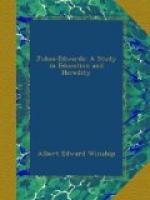The outbreak of the Revolutionary struggle was a most inopportune time for Timothy Edwards; but for that he would have become one of the wealthiest men of his day. All business was suspended and he gave himself to his country’s cause with intense devotion. He was at once appointed on a commission with General Schuyler to treat with the Indians; was appointed commissary to look after the supply of the army with provisions. From 1777 to 1780 he was a leader in the Legislature of Massachusetts; was elected to the Continental Congress with John Hancock and John Adams; was a colonel in the Massachusetts militia and a judge of probate. When the war broke out Timothy Edwards was worth $20,000, which he had accumulated in addition to all his other burdens. When the war closed he had nothing, and was $3,000 in debt to New York merchants. To understand what sacrifices he made it must be understood that when the government was in great straits he took $5,000 of money that was as good as gold and let the government have it, taking in return money that was of slight value. He also took fifty tons of flour to Springfield and let the government have it for paper money at par. There were no greater heroes in the Revolutionary war than such men as Timothy Edwards. He was nearly fifty years old when the war closed and he found himself the father of thirteen children and without property or business. Full of courage and enterprise he succeeded in supporting his family in comfort and in regaining a substantial property before his death, which occurred in the midst of the next war, October 27, 1813.
It was not an easy thing to educate children in those times. When the Revolutionary war broke out his oldest child was but thirteen, and when it ended he had ten children under twenty-one. There were only three books in the schools at Stockbridge during the war, Dilworth’s Spelling Book and Arithmetic and the Book of Psalms. From these the children of Timothy Edwards received their education and that it was a good training subsequent events show.
The first born, a daughter, married Benjamin Chaplin, Jr., a graduate of Yale (1778), and for her second husband Capt. Dan Tyler, of Brookline, Ct., a graduate of Harvard. Her second child, Edward, became Register of Probate. Jonathan, the second born, had several children who became prominent in professional and business life. Phoebe married Rev. Asahel Hooker, an eminent graduate of Yale, and for her second husband Rev. Samuel Farrer, a graduate of Harvard, and for many years treasurer and financial agent of Andover Theological Seminary. Her children were noted men and women, graduates of Yale and Dartmouth, clergymen, theological professors, secretary of the American Board of Foreign Missions, and secretary American Baptist Missionary Union, prominent teachers and authors.




